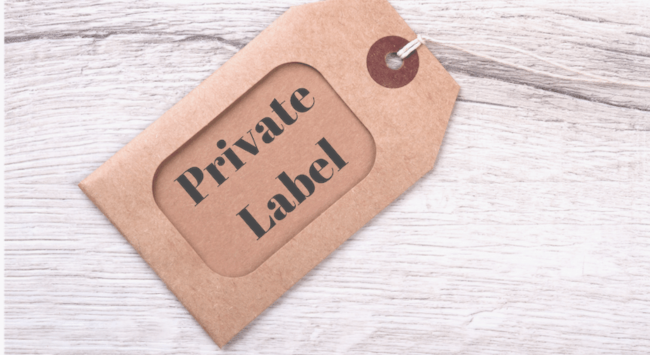
What is a Private Label Product? A Guide for Successful Private Label Businesses

For many small businesses and retailers, the private label business model is a proven path to success.

So what exactly are these customized, cost-effective products all about? Let’s dive into the ins and outs of private labeling—the process where goods are manufactured by one company but sold under another company’s brand name.
From understanding the basic concept to exploring successful examples of private-label brands, our comprehensive guide will provide you with everything you need to know.
Key Takeaways: What is a Private Label Product?
- A private label product is manufactured by a third-party supplier but sold under a retailer’s brand. This business model allows companies to sell products without producing them in-house.
- A private label retailer partners with a manufacturer to create a product that is customized to their specifications, including branding, packaging, and formulation.
- Businesses have complete control over branding, pricing, and marketing, enabling brand building and differentiation from traditional brands.
- While both involve selling products made by a third party, private labeling ensures exclusivity, whereas white labeling allows multiple retailers to sell the same product under different branding.
- Many industries utilize the private label model, including pet food, cosmetics, clothing, and health supplements, offering a cost-effective way to enter competitive markets.
- The private labeling cost varies based on product customization, packaging, and order quantities. However, private label products often yield higher profit margins than established brands.
- Selecting a reputable private label supplier ensures product quality, adherence to industry standards, and a streamlined supply chain.
- To maintain high standards, private label sellers must conduct rigorous quality control checks and use customer feedback to refine their products.
- While private labeling offers own label branding advantages, challenges include managing inventory, finding reliable third-party manufacturers, and investing in professional product photography for marketing.
- A successful private label business requires strategic planning, market research, and a commitment to providing high-quality products that compete with premium brands and traditional brands in the business world.
Understanding Private Label Products
Private label products are manufactured by third-party manufacturers and sold under another company’s brand name. This private label model allows retailers to maintain complete control over branding, marketing, and pricing.
Definition And Concept Of Private Label Products

Private label products, often referred to as store brands or own-brand products, are items manufactured by one company and sold under another company’s brand name. For food manufacturers, this means producing a variety of goods that cater to the specific needs and preferences of retailers who market them as their unique offering.
The concept has gained significant traction in recent years as more retailers recognize the potential for higher profit margins with private label goods. A prime example is Trader Joe’s – an American grocery chain boasting a wide selection of their exclusive private label foods which account for around 80% of their overall inventory.
Advantages Of Private Labeling
If you’re considering a private label supplier, here are the top benefits of using this business model:
- Cost-effectiveness: Private label or store brand products are often cheaper than their national brand counterparts due to reduced marketing and advertising costs.
- Control over branding and marketing: As the retailer, you have complete control over branding and marketing your private label products, allowing for more flexibility in product development and customization.
- Increased profit margins: Retailers typically earn higher profit margins from private label products since they spend less on manufacturing costs compared to national brands.
- Differentiation from competitors: With customized packaging and unique branding, private label products can stand out from other competitors’ offerings on the shelf.
- Fostering customer loyalty: By offering high-quality private label products at competitive prices, retailers can build customer loyalty and trust in their brand.
- Lower risk: Since retailers have more control over the product’s development and marketing, there is less risk involved with private label products compared to developing a new product from scratch.
Overall, private labeling can be an effective way for food manufacturers to differentiate themselves from competition while increasing profits and building customer loyalty.
Differences Between Private Labeling And White Labeling
Although both private labeling and white labeling involve selling products under a different brand name, there are some key differences between the two concepts. Understanding these differences can help food manufacturers decide which approach is best for their business.
| Private Labeling | White Labeling |
| Products are manufactured specifically for the retailer, allowing for customization and exclusive branding. | Products are pre-existing and generic, with retailers only adding their branding to an already developed product. |
| Greater control over product development, allowing for innovations and meeting specific customer needs. | Less control over product development, as the product is already designed and created by the manufacturer. |
| Typically used for physical goods, but can also be applied to digital and software products. | Most commonly used for digital and software products, but can also be applied to physical goods. |
| Potentially higher profit margins as a result of customization and exclusivity. | Lower profit margins due to less differentiation from other retailers selling the same white-labeled product. |
| It requires more involvement in product development but offers greater control over product quality. | Requires less involvement in product development, allowing for quicker market entry and lower initial investment. |
In summary, private labeling provides more opportunities for customization and control, while white labeling offers a faster and less resource-intensive alternative. Food manufacturers should consider their specific needs and goals when choosing between these two methods of product branding.
Benefits Of Private Label Products
Private label products offer several benefits, including control over branding and marketing, flexibility in product development and customization, cost-effectiveness, and increased profit margins.
Control Over Branding And Marketing

Private label products offer retailers a significant advantage in controlling and managing their branding and marketing strategies. Retailers can create unique brand identity and recognition, differentiate themselves from competitors, and establish customer loyalty by leveraging private label products.
They have the flexibility to customize product packaging or labeling, ensuring that the product looks consistent with existing branding efforts. Moreover, with a private label business, retailers have full control over their marketing campaigns without dependency on manufacturers who produce national brands.
As a result, they can develop effective promotional strategies that align with their brand values and objectives while meeting customer needs at an affordable price point.
Flexibility In Product Development And Customization
Private label products offer a lot of flexibility in terms of product development and customization. Retailers have the ability to work closely with manufacturers or suppliers to create products that meet their specific needs and specifications.
With private labeling, companies can also tailor their product offerings based on market trends and consumer demand.
Overall, the flexibility offered by private labeling enables retailers to create unique branding strategies while controlling costs without sacrificing quality or performance – a win-win situation for both producers and consumers alike.
Cost-effectiveness
Private labeling costs less than traditional brands, making it a profitable strategy for private label retailers. This is because private label brands usually spend less on manufacturing and packaging, which allows them to sell their products at a lower price point.
For example, Trader Joe’s line offers high-quality food products at affordable prices as part of its private label offerings. By creating their own product lines, retailers can control costs while still offering quality products to consumers.
Increased Profit Margins
Private label sellers can maximize profit margins by working with private label suppliers to reduce production costs. Retailers have more control over the manufacturing process, allowing them to negotiate better prices with their manufacturers or suppliers.
Private labeling is an effective strategy for food manufacturers looking to expand their product line without investing in expensive marketing campaigns or developing new recipes from scratch.
How To Create And Sell Private Label Products
Learn the step-by-step process of creating and selling private label products, from finding a manufacturer or supplier to branding and marketing your product for success.
Steps To Creating A Private Label Product
Creating a private label product can be a great way for food manufacturers to build their brand and increase profits. Here are the steps to creating a successful private label product:
- Determine your target market: Before creating your private label product, you need to know who you’re selling it to. Research your target audience – their preferences, needs, and buying habits.
- Choose your private label product: Research customer feedback, analyze supply chain trends, and identify opportunities for brand building.
- Find a manufacturer or supplier: Once you’ve decided on a product, you need to find a reliable manufacturer or supplier who can produce it according to your specifications.
- Develop the branding and packaging: Create compelling branding that differentiates your private label offering from competing products while still fitting in with industry standards. Make sure the packaging not only looks good but also accurately represents the quality of the product inside.
- Test the product: Before launching your private label product, make sure to test it thoroughly for quality assurance and compliance with regulations.
- Set pricing and profits: Determine how much you’ll charge for each unit sold, taking into account production costs and desired profit margins.
- Market and sell the product: Spread awareness about your new private label offering through online marketing tactics such as social media advertising and email campaigns targeting potential customers of both yours and other brands’ products.
By following these steps, food brands can create a successful private label line that appeals directly to their target demographic while increasing profits at the same time by taking advantage of lower manufacturing costs associated with outsourcing production to private label producers under their own brand name.
Finding A Manufacturer Or Supplier

To create your own private label product, you will need to find a manufacturer or supplier who can produce the product according to your specifications.
One option is to search for manufacturers online through directories such as Alibaba or ThomasNet. You can read reviews and compare prices from different suppliers before making a decision.
Select a private label supplier with a track record of quality control and compliance. Don’t be afraid to ask for samples, references, and certifications before committing to a supplier.
Branding And Packaging
Branding and packaging are crucial elements of private label products. When creating a private label product, it’s essential to have a strong brand identity to differentiate your product from competitors.
This includes defining your target audience, messaging, visual identity, and product positioning in the market. Packaging is equally important as it plays a significant role in attracting potential customers and making your product stand out on shelves or online platforms.
It should also convey relevant information about the product, including features, benefits, nutritional information (for food products), and instructions for use (if applicable).
In conclusion, branding and packaging play an essential role in creating successful private label products.
Marketing And Selling The Product
Once you have created your private label product and found a manufacturer or supplier, it’s time to start marketing and selling your product. This can be done through a variety of channels such as brick-and-mortar stores, e-commerce websites, social media platforms, and more.
Private label sellers can increase brand awareness by using private labeling services, influencer partnerships, and digital marketing campaigns. Additionally, offering discounts for first-time customers or running seasonal promotions can help boost sales and attract new customers.
Examples Of Successful Private Label Brands
Amazon Basics, Kirkland Signature by Costco, Trader Joe’s private label products, and Whole Foods’ 365 Everyday Value are all successful examples of private label brands.
Amazon Basics
One of the most successful private label brands out there is Amazon Basics. With products ranging from electronics to household items and even office supplies, Amazon Basics has become a staple for customers who want affordable yet reliable options.
Their strategy focuses on providing simple and functional designs that prioritize quality over flashy branding. In fact, their packaging is intentionally minimalistic in order to reduce costs while maintaining consistent branding across all their products.
Thanks to this approach, Amazon Basics has become a go-to choice for budget-conscious consumers who still want good value for their money.
Kirkland Signature
One example of a successful private label brand is Kirkland Signature, which is sold exclusively at Costco. Kirkland Signature offers high-quality products ranging from food items to household goods and electronics.
The brand has become well-known for delivering great value and quality, often surpassing that of national brands. For instance, their organic maple syrup was ranked as the best by Consumer Reports in 2019.
Trader Joe’s Private Label Products
Trader Joe’s private label products are a prime example of successful private labeling in the food industry. The grocery chain offers a wide range of unique and high-quality products under its own brand name.
One reason for the success of Trader Joe’s private label products is their focus on quality and taste. They have built a reputation for offering gourmet-style foods at affordable prices, making them a popular destination among foodies and budget-conscious shoppers alike.
Overall, Trader Joe’s is an excellent example of how private labeling can help businesses stand out in crowded markets.
Whole Foods’ 365 Everyday Value
One example of a successful private label brand is Whole Foods’ 365 Everyday Value. The brand offers customers high-quality products at an affordable price point without compromising on taste or nutrition.
What sets the 365 Everyday Value line apart is its emphasis on organic and natural ingredients, which appeals to health-conscious consumers looking for healthier options.
With more people becoming aware of the benefits of organic foods, selling private label brands like 365 Everyday Value can be a smart business strategy for food manufacturers looking to tap into this growing market.
Conclusion
In conclusion, private labels are an effective way for retailers to offer unique and affordable products to their customers. With the ability to customize and control branding and marketing, retailers can differentiate themselves from competitors and increase profit margins.
Whether it’s physical goods or software products, private labeling is a strategy that has been around for a long time and continues to prove successful in today’s market.
For more Information Visit Our website.
FAQs
1. What is a private label business model?
The private label business model allows companies to sell products under their own brand while a third-party manufacturer handles production. This enables businesses to offer exclusive, customized products without the need for in-house manufacturing.
2. How does a successful private label business operate?
A successful private label business partners with a reliable private label supplier to create high-quality products. The brand owner oversees marketing, pricing, and branding to differentiate their offerings from traditional brands.
3. What are the benefits of selling private label products?
Private labeling provides complete control over branding, pricing, and packaging. It allows businesses to establish their own label, compete with premium brands, and build customer loyalty without competing with established brands.
4. How do private label sellers ensure product quality?
Quality control is crucial in private labeling. Private label sellers work closely with manufacturers, conduct product testing, and use customer feedback to refine and improve their products.
5. What are the costs involved in private labeling?
Private labeling cost depends on factors such as product complexity, packaging, and order volume. While initial investment is required, private labeling can be more cost-effective than developing products from scratch.
6. How does private labeling compare to traditional brands?
Private labeling allows businesses to sell the same product as premium brands but under their own branding. This helps companies stand out in the business world while maintaining competitive pricing and a strong supply chain.




